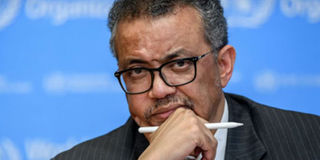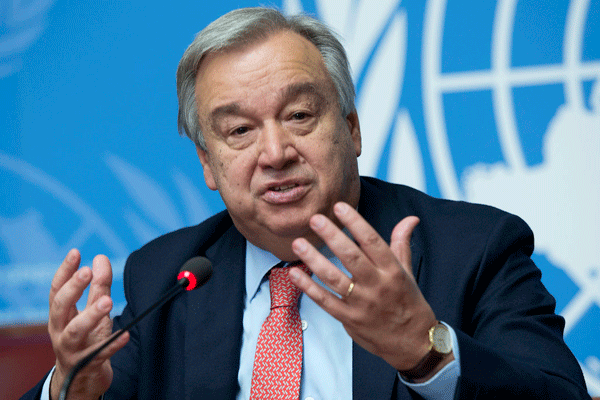Ethiopia withdraws nomination of WHO boss

World Health Organisation chief Dr Tedros Adhanom
What you need to know:
- In October, Kenya, Rwanda and Botswana wrote to the Board endorsing Dr Tedros’s candidature.
- On Thursday, Ethiopia said he has celebrated TPLF victories and engaged in selective outrage, including exaggerating the humanitarian situation in Ethiopia.
BY
Ethiopia’s government on Thursday said it will not support the re-election of Dr Tedros Adhanom, its national, for his second term as Director-General of the World Health Organisation, as political differences in the country played out on world stage.
In a bizarre letter to the Executive Board of the World Health Organisation, Ethiopia’s Ministry of Foreign Affairs said Dr Tedros, himself a former Foreign Minister, threatens the organisational integrity of the WHO because he has taken sides with a proscribed group in his native country.
“He has not lived up to the integrity and professional expectations required from his office and position,” said a letter sent to the Board, currently chaired by Dr Patrick Amoth, the Kenyan Obstetrician and Gynecologist and Director-General of the Ministry of Health.
“He has been interfering with the internal affairs of Ethiopia including Ethiopia’s relations with the state of Eritrea…continues as an active member and supporter of the TPLF that is proscribed as a terrorist group by the Ethiopian parliament.”
Ethiopia said it wants the Board, a 34-member body of the WHO, to investigate his conduct for violating is “professional and legal responsibility.” But the letter was sent ahead of a crucial 150th session of the Board when it will “screen” the candidature of Dr Tedros for his second term as Director-General of world health agency.
The Board is due to meet for its annual meeting on January 24-29 to agree on the agenda for the World Health Assembly as well as vet the candidates for the upcoming elections for the Director General which are due in May during the 75th World Health Assembly. The Assembly will vote only on candidates submitted by the Board and since the nominations closed in November, only the Ethiopian incumbent has shown interest in the seat.
In October, Kenya, Rwanda and Botswana wrote to the Board endorsing Dr Tedros’s candidature.
Nairobi’s diplomats say Kenya is supporting Dr Tedros to complete his maximum tour of two five-year terms because it is “Africa’s turn.” Having served under two critical disease outbreaks: The Ebola epidemic in the DRC in 2018 and the Covid-19 pandemic since late 2019, Kenya says Dr Tedros has passed his toughest exams yet.
His candidature has also been supported by the European Union, Barbados, Bahrain, Tonga, Trinidad and Tobago, Malta, Oman, Indonesia and Kazakhistan. Traditionally, one only needs to be nominated by any of the 194 members of the WHO Assembly, not necessarily his home country, to contest for the seat.
But Ethiopia wants him out of the race for allegedly blowing the TPLF horn on the world stage. Earlier in 2021, Addis Ababa claimed he had tried to acquire arms and diplomatic backing for the Tigray People’s Liberation Front (TPLF), a movement that was part of the ruling coalition when he served as Minister, but which Ethiopia now considers a terrorist group. The TPLF has been fighting Ethiopian, and allied regional militia, forces since November. Tedros denied siding with the TLF, and claimed his own family had been hurt in the conflict. Ethiopia has yet to make a public endorsement, but it will be curious if they chose to undercut him.
On Thursday, Ethiopia said he has celebrated TPLF victories and engaged in selective outrage, including exaggerating the humanitarian situation in Ethiopia.
Tedros has not yet responded to the blame, but has in the past denied previous accusations by Ethiopia, even though he admitted his kin had been affected by the war in Tigray.
The Board, according to Resolution WHA65.15 of the Assembly, can only reject a candidate if it is proven he lacks technical background in a health field, lacks demonstrable leadership and advocacy skills, is incompetent, lacks sensibility to cultural, social and political differences, is in poor health or has violated WHO or UN codes of conduct.
Born in March 1965 in Asmara, today’s Eritrea, the Ethiopian biologist was Minister for Health and later Foreign Affairs in his country under the Preme Minister Meles Zenawi and later Hailemariam Desalegn. He is credited for lowering new HIV infections in his country at the time and pioneered a universal healthcare system Ethiopia has tried to implement.
When he took over WHO in 2017, he became the first African to do so, the first person to be voted in from multiple candidates and the only non-medic to hold the seat. His campaign was fronted by bot Ethiopia and Kenya, received an endorsement from the African Union and widely supported by China, against the US, UK and Canada who had backed a British medic, David Nabarro for the job.





